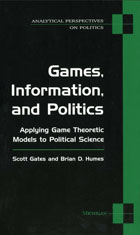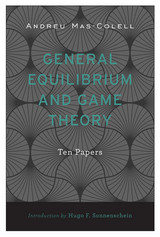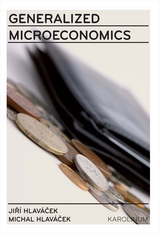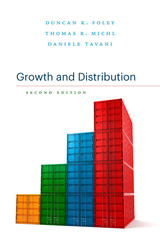5 start with G start with G

This volume consists of twenty-two selected contributions to various areas of game and economic theory. These important and pathbreaking contributions are all by former students of Robert J. Aumann, to whom this volume is dedicated. The volume will no doubt shed light on the far-reaching pertinence of game theory and its application to economics, and also on the monumental impact of Aumann on this discipline.
Sergiu Hart is Alice Kusiel de Vorreuter Professor of Mathematical Economics and Director of the Center for Rationality and Interactive Decision Theory, The Hebrew University of Jerusalem. Abraham Neyman is Professor of Mathematics, The Hebrew University of Jerusalem, and Leading Professor of Economics and Mathematics, State University of New York at Stony Brook.


Andreu Mas-Colell revolutionized our understanding of competitive markets, price formation, and the behavior of market participants. General Equilibrium and Game Theory offers readers a compendium of his most important scholarly contributions, gathering in a single volume the groundbreaking papers that have solidified his standing as one of the preeminent economic theorists of our time.
Built upon the foundations of neoclassical economics, Mas-Colell’s work is distinguished by a mathematical and analytical elegance that brings theory closer to real-world situations. He overturns the standard assumption of general equilibrium theory—that markets are perfectly competitive and their participants are perfectly rational—and concludes that neither the law of supply and demand nor the existence of equilibrium prices depends on the rationality of agents. Similarly, Mas-Colell (working with Sergiu Hart) challenges classical game theory’s reliance on rational behavior, demonstrating that adaptation and learning shape the dynamics of repeated games.
Addressing central questions of finance, trade, industrial organization, and welfare economics, Mas-Colell shows the surprising power and versatility of differentiability and linear-space mathematical techniques, and he emphasizes the fruitfulness of cooperative game-theory approaches, such as Shapley value theory and the Bargaining Set, for understanding competition and distribution. General Equilibrium and Game Theory is a signal contribution to economic theory and an invaluable resource for anyone wishing to study the craft of a master of economic modeling.


A major revision of an established textbook on the theory, measurement, and history of economic growth, with new material on climate change, corporate capitalism, and innovation.
Authors Duncan Foley, Thomas Michl, and Daniele Tavani present Classical and Keynesian approaches to growth theory, in parallel with Neoclassical ones, and introduce students to advanced tools of intertemporal economic analysis through carefully developed treatments of land- and resource-limited growth. They cover corporate finance, the impact of government debt and social security systems, theories of endogenous technical change, and the implications of climate change. Without excessive formal complication, the models emphasize rigorous reasoning from basic economic principles and insights, and respond to students’ interest in the history and policy dilemmas of real-world economies.
In addition to carefully worked out examples showing how to use the analytical techniques presented, Growth and Distribution presents many problems suitable for inclusion in problem sets and examinations. Detailed answers to these problems are available. This second edition includes fresh data throughout and new chapters on climate change, corporate capitalism, models of wealth inequality, and technical change.
READERS
Browse our collection.
PUBLISHERS
See BiblioVault's publisher services.
STUDENT SERVICES
Files for college accessibility offices.
UChicago Accessibility Resources
home | accessibility | search | about | contact us
BiblioVault ® 2001 - 2024
The University of Chicago Press









